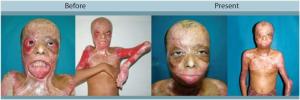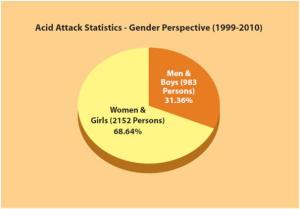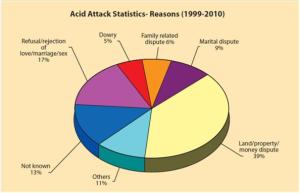It’s been awhile since I’ve posted anything here because I’ve had to focus on other things, but I thought this paper for my Humanities class fit in well with the theme of this blog. It is a subject I wish to share in hopes it will be shared. Thank you for taking the time to read.
By Dana McClellan
In Islamabad Pakistan the government has set up a hospital with a free clinic for the over one-hundred acid attack victims needing treatment annually and there are many which go unreported (Saving Face). Most of the victims lie sleeping peacefully in their beds only to be awoken by a horror that will change their lives forever. The victims, usually young women, range in age from thirteen to thirty-five (Annual Report ASF). Most of the attacks are carried out by disgruntled suitors—i.e. men who have made sexual advances and had been rejected, and married men who don’t want to have to deal with their wives anymore. These men treat their women like animals. They are nothing more than property with a dowry attached. In most acid attacks the women are very young and not yet married, thereby ruining any chance of an “ideal” life with marriage, house and children. To these men, a female in this society is put on this earth to procreate, take care of the house and children, make an income somehow, and see to it that her husband’s “needs” are met. It is a patriarchal society where the man is seldom prosecuted for any type of domestic violence and can get away with most anything when it comes to the treatment of his wife and daughters.
While most women here in America think “I would never let a man treat me like that!”; Answer this question: how does one prevent an attack while sleeping? How can we dare to suggest what we would do while not having been born into that type of culture? America needs to be enlightened about a lot of things, but we also need to pick our battles carefully because as individuals in an individualistic society, there is only so much of each of us to go around. Therefore, this paper will attempt to put a face on the “faceless” in hopes that someone will read it and take up the cause. If more people were exposed to what is taking place around the world with these acid attacks, there would obviously be more pressure for governments to smash this out of existence. Instead of perpetrators living free in their own smug little worlds, they should fear consequences and be shunned in their communities.
IS THIS AMERICA’S PROBLEM?
There are many in America today with the “We have enough problems to deal with in our own country; let them deal with their own problems” attitude about helping out humanity in countries other than our own. As the planet becomes relatively smaller to us through technology, and our ability to get things done can happen within a matter of seconds, we need to realize we are not just citizens of our own country; we are citizens of the world. After watching the HBO documentary Saving Face, which follows two female victims of acid attacks in Pakistan—Zakia who is thirty-nine years old and Rukhsana who is twenty-three; I was profoundly struck by an intense sadness over their stories. I sit here in my country with all types of freedoms and hopes and dreams; I sit here silently and think to myself how unsatisfied I am with my life and how there is so much about life that is unfair, AND I AM ASHAMED. I have my own identity and I can do with it as I please. I don’t have to endure abuse from anyone; I can go to college and educate myself; I can use my voice to speak out loud and clear about my rights as a human being; I can write essays that bring attention to women who are abused and post it all over the internet if I so choose; I can pursue happiness. I am free—they are not. These women live in a society where help is hard to get because they are second class citizens.
THE STORIES OF ZAKIA AND RUKHSANA
As much as we would all like to say that physical beauty isn’t what’s important, try living without a face for awhile. When we look upon these women and witness the shame, the agony and the hopelessness; we soon realize that it’s not just physical beauty they would like to have back. It goes much deeper than that. To all of these melted faces belong melted identities, leaving these women incased in a claustrophobic world of misery and lack of purpose. Their society looks upon them as pathetic and worthless, and unless funds are raised or services are donated, these women will never have the opportunity for reconstructive surgery.
HELP FROM A HERO SURGEON
There is a very successful plastic surgeon in the documentary by the name of Dr. Mohammed Jawad from London who was born in Pakistan, but raised in Karachi, who is known for his burns work. He mentions in the film that when he heard about the acid violence in his hometown he felt he needed to do something about it (Saving Face). Jawad is introduced to these women. First, he meets Zakia who tells him of her marriage before the attack. She said it was bad from the beginning. Her husband (Pervez) was a drug addict and alcoholic who would steal money from her and if she ran out of money he would beat her. Zakia finally made the decision to divorce him and while she was standing outside the courthouse, her husband came up to her and said something about making a spectacle out of her and then threw the acid at her face. Her beautiful face melted completely on one side and blinded her in one eye—all in a matter of seconds. Pervez was taken into custody and while he’s in there we are able to see and hear a little snippet of an interview with him. He shows no remorse.
The other woman, Rukhsana, also has a heartbreaking story and as she’s telling it we are soon made aware that it wasn’t just her husband who was responsible for the attack—it was also her mother and sister-in-law. First, her husband threw the acid on her, next her sister-in-law threw gasoline on her, and finally her mother-in-law lit a match and set her on fire. But that’s not the worst part. The Doctor then asks “where do you live now?” and she says as she starts to cry, “with them, I live with them.” She goes on to explain that her kids became very sick and she couldn’t afford to care for them any longer so she had to make up with her husband and her in-laws and move back in with them. At this point, the doctor is fighting back his own tears.
TORMENTED LIFE
Rukhsana is forced to live in the same room as the attack and forbidden access to the rest of the house, as well as her children. Yasir, Rukhsana’s husband, is not in custody and is smirking as he tells the interviewer that Rukhsana threw acid and gasoline on herself while she was standing too close to a candle, which caught her on fire. He goes on to say that ninety-nine percent of the women in the burn unit have done it to themselves. Both Rukhsana’s and Zakia’s husbands show no remorse.
Zakia, still involved with her court case, is continually being threatened by her husband who is telling her that he will “kill her entire family” while she awaits the verdict. The case is delayed but during the interim there is a new bill brought to the floor of parliament. This bill would “mandate life sentences for the perpetrators of acid-related violence” (Saving Face).The bill passes unanimously and the women rejoice.
FINALLY SOME JOY
Finally, Zakia with her son by her side, is told of the verdict by her lawyer; her husband received two life sentences and was the first to receive the punishment under the new law. Later, as Zakia comes to the end of her reconstructive surgery, there is no more that the doctor can do so she is then fitted with a prosthesis which will fit over her cheek and is attached to a pair of glasses. The part that fits over her cheek also has a very realistic fake eye built into it which gives her symmetry and enough confidence to go out into public without her veil, burqa and sunglasses. Zakia has a new lease on life.
In the meantime, while Rukhsana is going through her pre-surgery testing, she finds out she’s pregnant, but doesn’t realize the gravity of the situation. Instead, she is hopeful that God may want to bring her joy through this baby. Surgery is now out of the question because of the pregnancy. Dr. Jawad reassures her by telling her that he will take care of her and resume the operations once she has delivered. She hopes to have a baby boy for obvious reasons—and does.
Both of these women were extremely lucky to have had the chance to be featured in the documentary. Not only because they are helping to raise awareness, but also because they are receiving help that most women in their country will never get. Even though the punishments are tougher, many incidents still go unreported and if they are reported, many of the perpetrators are acquitted.
CAUGHT IN THE CROSSFIRE
We’ve heard about the women who are victims, but men are victims also. Even worse, so are children. According to the Acid Survivor’s Foundation 2010 Annual Report, attacks against men are on the rise and are usually brought about by disagreements over land rights. The report goes on to say that the cases involving children happen under a variety of circumstances. In one case, a father showered his little daughter with acid simply because he wanted a boy. In many other cases, the children are just in the wrong place at the wrong time and may be standing or lying next to a target getting caught in the crossfire. We can’t imagine the pain these children must endure and the fact that it has quite possibly happened to more than one family member at a time makes it beyond comprehension.
HOW CAN AMERICA HELP?
The Acid Survivors Foundation gives us a list of eight things we can do to help. Some of these things are easier than others for the average person.
Here is the list:
- Donate medicines, medical equipment.
- Impart medical skills and training.
- Sponsor medical treatment at home and abroad.
- Support the expenses of a survivor and take care of medical/social needs.
- Creative employment opportunities at private and government levels.
- Give vocational training.
- Donate household items e.g. clothes, furniture, bedding, crockery etc. needed for the survivors.
- Raise awareness about all forms of violence against women and acid throwing in your location/area.
With access to the web and the creative ways Americans are able to raise funds and donations; numbers seven and eight are easily doable. The amount of time we all spend on Facebook and Twitter alone could raise awareness in an instant. We can share articles, blogs, links, and videos that will work to enlighten our country and the rest of the world to this horrendous act of violence and bring help and comfort to the victims.
EXTERNAL EFFECTS OF ACID
 Figure 1. Suicide victim Fakhra Yunus in a before and after shot. Source: GeoNews via YouTube. 2012.
Figure 1. Suicide victim Fakhra Yunus in a before and after shot. Source: GeoNews via YouTube. 2012.
 Figure 2. Akash, a ten-year-old boy who was severely burned by acid on 25 October 2009. These pictures are taken before and after surgery. Source: Acid Survivors Foundation “Annual Report.” Acid Survivors Foundation. 2010.
Figure 2. Akash, a ten-year-old boy who was severely burned by acid on 25 October 2009. These pictures are taken before and after surgery. Source: Acid Survivors Foundation “Annual Report.” Acid Survivors Foundation. 2010.
SOME STATISTICS
These attacks are not only taking place in Pakistan, it’s happening in many places all over the world. Here are some of the other countries: Cambodia, Laos, Vietnam, Bangladesh, Afghanistan, Iran, Nepal, India, China, Japan, Algeria, Ethiopia, Nigeria, Kenya, Uganda, Mexico, Jamaica, Guyana, Greece, Turkey, Australia, and the UK.
Figure 3. Acid Attack Statistics – Reasons (1999-2010). Source: Acid Survivors Foundation “Annual Report.” Acid Survivors Foundation. 2010.
 Figure 4. Acid Attack Statistics – Gender Perspective (1999-2010). Source: Acid Survivors Foundation “Annual Report.” Acid Survivors Foundation. 2010.
Figure 4. Acid Attack Statistics – Gender Perspective (1999-2010). Source: Acid Survivors Foundation “Annual Report.” Acid Survivors Foundation. 2010.
CONCLUSION
In a world where many people are suffering a great many things, it’s very hard to muster up the strength and compassion to see beyond our own issues. But I do know this; after watching the documentary Saving Face, and after conducting the research for this paper, I am deeply affected by the pain of these victims. I believe we all have it within our power to raise awareness about this issue. Maybe somehow through our six-degrees of separation there will be someone “out there” who will care enough to donate something that will really make an impact. It could come from something as simple as a “post” or “share” on Facebook. Please take the time to go to go to the website: http://www.hbo.com/documentaries/index.html#/documentaries/saving-face where you can view the trailer to Saving Face and find other info. If you are a subscriber to HBO, you can view the documentary in its entirety at www.hbogo.com.

